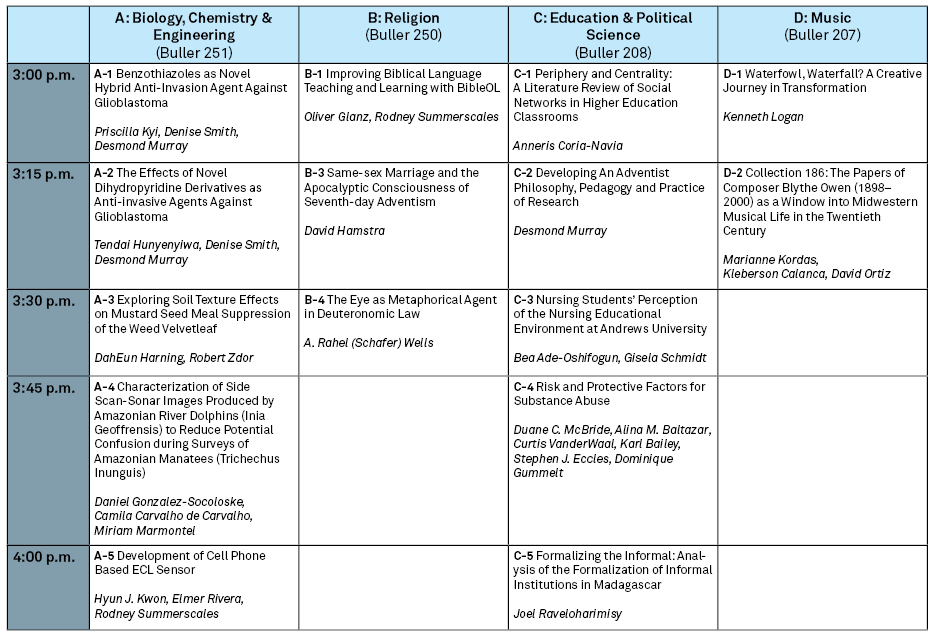Presentation Title
D-2 Collection 186: The Papers of Composer Blythe Owen (1898–2000) as a Window into Midwestern Musical Life in the Twentieth Century
Presenter Status
Director, Music Materials Center, James White Library, Andrews University
Second Presenter Status
Graduate Research Assistant, MM choral conducting
Third Presenter Status
Graduate Research Assistant, MM vocal performance
Preferred Session
Oral Session
Start Date
26-10-2018 3:15 PM
End Date
26-10-2018 3:30 PM
Presentation Abstract
Despite being named composer of the year in 1981 by the Michigan Music Teachers Association, winning numerous awards for her compositions, and studying piano, theory, and composition with several famous figures of the twentieth century, Dr. Blythe Owen is not well known to music historians today due to the lack of published material by and about her. I believe, however, that her papers—housed as Collection 186 in the Andrews University archives in Berrien Springs, MI—provide an extensive and unique window not only into the life and work of one female American composer navigating the challenges of the Midwestern professional landscape throughout the breadth of the twentieth century, but also into the workings of the institutions in which she studied and taught (Roosevelt University, Northwestern University, Le Conservatoire Américain de Fontainebleau, the Eastman School of Music, and Andrews University). Moreover, the papers offer a distinct perspective on the lives of the influential musicians with whom Owen interacted, people such as Rudolf Ganz, Florence Price, Alfred Nolte, Robert Casadesus, Nadia Boulanger, and Howard Hanson. The majority of this valuable information is contained in a trove of over 2,000 letters written by Owen to her mother from the early 1920s to the early 1960s, and in her diaries dating from 1954–1991. The current presentation will cover a brief overview of Owen’s biography and compositions (with an emphasis on her 40-year career in Chicago), a description of the multifaceted Blythe Owen Project founded by Linda Mack in 1998 to document and disseminate information on Owen’s life and work, and an in-depth exploration of the contents of Collection 186 with a special focus on the scope and contents of Owen’s letters and diaries. It has been my mission over the past five years to properly process and describe Collection 186. We are now at an exciting juncture where the collection is ready to be newly opened up for research in a number of scholarly areas: twentieth-century American composition, the influence of French music and musicians in American musical life, the Chicago musical scene throughout the core of the twentieth century, and women in music. There has been a curious paucity of musicological scholarship on twentieth-century musical life in Chicago and the greater Midwest. Blythe Owen—via her papers in Collection 186—provides an important source for filling that vacuum.
D-2 Collection 186: The Papers of Composer Blythe Owen (1898–2000) as a Window into Midwestern Musical Life in the Twentieth Century
Despite being named composer of the year in 1981 by the Michigan Music Teachers Association, winning numerous awards for her compositions, and studying piano, theory, and composition with several famous figures of the twentieth century, Dr. Blythe Owen is not well known to music historians today due to the lack of published material by and about her. I believe, however, that her papers—housed as Collection 186 in the Andrews University archives in Berrien Springs, MI—provide an extensive and unique window not only into the life and work of one female American composer navigating the challenges of the Midwestern professional landscape throughout the breadth of the twentieth century, but also into the workings of the institutions in which she studied and taught (Roosevelt University, Northwestern University, Le Conservatoire Américain de Fontainebleau, the Eastman School of Music, and Andrews University). Moreover, the papers offer a distinct perspective on the lives of the influential musicians with whom Owen interacted, people such as Rudolf Ganz, Florence Price, Alfred Nolte, Robert Casadesus, Nadia Boulanger, and Howard Hanson. The majority of this valuable information is contained in a trove of over 2,000 letters written by Owen to her mother from the early 1920s to the early 1960s, and in her diaries dating from 1954–1991. The current presentation will cover a brief overview of Owen’s biography and compositions (with an emphasis on her 40-year career in Chicago), a description of the multifaceted Blythe Owen Project founded by Linda Mack in 1998 to document and disseminate information on Owen’s life and work, and an in-depth exploration of the contents of Collection 186 with a special focus on the scope and contents of Owen’s letters and diaries. It has been my mission over the past five years to properly process and describe Collection 186. We are now at an exciting juncture where the collection is ready to be newly opened up for research in a number of scholarly areas: twentieth-century American composition, the influence of French music and musicians in American musical life, the Chicago musical scene throughout the core of the twentieth century, and women in music. There has been a curious paucity of musicological scholarship on twentieth-century musical life in Chicago and the greater Midwest. Blythe Owen—via her papers in Collection 186—provides an important source for filling that vacuum.




Acknowledgments
2018 AU Faculty Research Grant